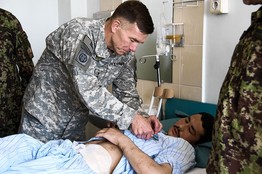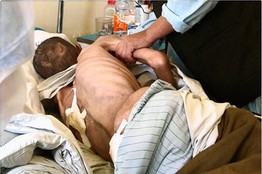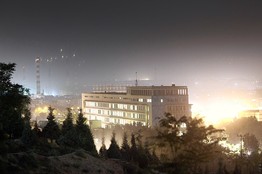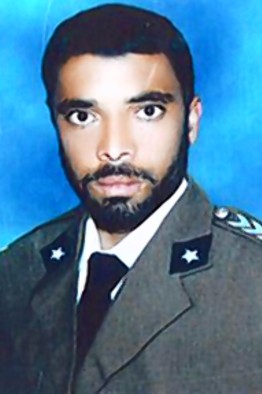At Afghan Military Hospital, Graft and Deadly Neglect
Sept. 3, 2011 By MARIA ABI-HABIB
KABUL—American officers deployed as mentors in Afghanistan's main military hospital discovered a shocking secret last year: Injured soldiers were routinely dying of simple infections and even starving to death as some corrupt doctors and nurses demanded bribes for food and the most basic of care.
The discovery, which hasn't previously been reported, added new details to longstanding evidence of gross mismanagement at Dawood National Military Hospital, where most salaries and supplies are paid for by American taxpayers.
Yet the patient neglect continued for months after U.S. officials discovered it, as Afghan officials rebuffed American pressure to take action, multiple documents and testimonies viewed by The Wall Street Journal show.
The way senior Afghan officials tolerated such deadly graft shows just how deeply rooted corruption has become in President Hamid Karzai's administration, as well as the limits of Washington's ability to rein it in. American advisers have since forced an improvement in conditions at the hospital.
Afghan policeman Ali Noor Hazrat had been admitted to Dawood hospital after being injured in a Taliban rocket attack on a police convoy last fall. Initially patched up by American doctors, he spent his last days starving there while his brother Sher sold off what little land the poor farming family had in order to bribe nurses and doctors for care and food, the brother said in an interview. In photos, Ali's flesh hangs off his frail, boney frame, his eyes heavy with pain. He died on Dec. 27, Afghan government documents show.
"Malnourished/starvation," said an internal coalition slide showing Mr. Hazrat, dated Nov. 5, prepared by American mentors at the hospital to document abuse cases. "Willful neglect," another bullet point said.
Sher Hazrat is determined that none of his relatives in the eastern Nangarhar province will consider joining Afghan security forces after what happened at Dawood. "If there's no service for us," he says, "why should we serve our country?"
Such sentiments have raised questions about how the fledgling Afghan military would fare against Taliban insurgents once most U.S. troops depart in 2014.
Dawood is the premier hospital of the Afghan security forces, akin to the Walter Reed Army Medical Center in the U.S.
As early as 2006, American officers noted evidence of severe dysfunction at the hospital, including patients who appeared to be malnourished, a U.S. military mentor who served there at the time says. He adds that the findings were reported to the Afghan Ministry of Defense, but no action was taken to improve conditions.
In 2008, doctors complained to hospital administrators that patients were being given defective morphine, according to internal documents produced by the NATO Training Mission-Afghanistan, or NTM-A. Later testing revealed the presence of counterfeit morphine, suggesting that U.S.-procured medicine had been diverted.
The NTM-A command, headed since November 2009 by U.S. Army Lt. Gen. William Caldwell, is spending $11.6 billion this year alone, more than 90% of it funded by U.S. taxpayers, on building up the Afghan army and police.
The biggest problem, American officials dealing with the hospital concluded by the middle of last year, was the Afghan army's politically connected surgeon general, Gen. Ahmed Zia Yaftali. As early as May 2010, U.S. officials say they confronted Gen. Yaftali about missing pharmaceuticals at the hospital and asked him to investigate. They ultimately came to suspect that he himself was profiting from graft, according to mentors and senior NTM-A commanders. The alleged theft of pharmaceuticals in the hospital has previously been reported by the Associated Press.
In an email to Gen. Caldwell dated August 25, 2010, U.S. Army Col. Gerald Carozza, a senior legal mentor at the Afghan defense ministry, complained that corruption was "deep and wide" within the senior leadership of the Afghan defense ministry and army and urged him to pressure the defense minister to allow various internal investigations to proceed. He said in the email that the Afghan army chief of staff's legal team was developing a case against Gen. Yaftali involving "a $20 million (US) theft from [the defense ministry] and pilfering $153 million (US) worth of medical supplies."
Gen. Yaftali denied all allegations of impropriety in a phone interview and declined to discuss them further, saying he would "only answer" to the Afghan defense ministry.
In his reply to Col. Carozza, Gen. Caldwell argued that the Afghan government needed to take responsibility for combatting corruption in the military. "We're not going to be able to solve this for them. Keep encouraging them to do the right thing," he wrote.
The U.S. government in general has been trying to build Afghan institutions that can solve their own problems, in preparation for an eventual U.S. withdrawal.
"We can build the greatest army, we can build the greatest police force," Gen. Caldwell said in an interview. "But if we don't have the rule of law being implemented...then we were not going to have legitimacy in this government."
In a Sept. 14 visit to the hospital to show America's appreciation to wounded Afghan soldiers, Gen. Caldwell was accompanied by the Afghan army chief of staff, Lt. Gen. Sher Mohammed Karimi. There, the two stopped by the bed of an emaciated Afghan soldier. Gen. Caldwell thanked him for his service and let Gen. Karimi pin a U.S. Army achievement medal to the Afghan soldier's bedsheets.
Gen. Caldwell said he was emotionally moved when he saw the patient's condition, but wasn't yet aware that neglect at the hospital was systemic.
Minutes after the American general left, the Afghan soldier—who hadn't been fed by the hospital in weeks—threw out his medal, people present in the hospital say.
A beefed-up group of at least two dozen U.S. military mentors had arrived at the hospital in August 2010 as part of the "surge" of American forces in Afghanistan. They began to deploy throughout the wards, replacing an earlier group that had less direct contact with patients.
By the following month, the new mentors began to document what they describe as horrific conditions. Maggots fed off patients' open wounds. Nurses and doctors refused to help amputees to the bathroom, and they soiled their beds for days.
Several patients died of simple infections because their bandages would go unchanged for weeks, while at least four died of complications related to malnourishment, according to mentors and internal documents.
In late September, Gen. Karimi was invited to attend an Afghan shura, a traditional meeting, at the hospital with Canadian Brigadier Gen. David Neasmith, the assistant commander for army development at the NTM-A. NATO officials pressed Gen. Karimi to address the problem of staff absenteeism and missing medicine, a U.S. mentor who was present says. But Afghan hospital and army officials who attended the meeting steered the conversation away from such issues and asked for raises and promotions, the mentor says.
As weeks passed without progress, the mentors say they assembled more evidence of neglect, including detailed medical charts and photos showing emaciated patients and bedsores a foot long and so deep that bones protruded from them.
In an Oct. 4 document emailed by the mentors to Gen. Neasmith, they complained about the hospital's intensive-care unit, among other issues: "The most dynamic and ill affected is the ICU, whereby favoritism, ambivalence, incompetence coupled with understaffing lead to the untimely deaths of patients daily, occasionally several times per day."
That month, Gen. Caldwell visited the Afghan defense minister, Gen. Abdulrahim Wardak, and persuaded him to launch a new investigation into Gen. Yaftali, according to two U.S. officers. Gen. Wardak and the Afghan defense ministry spokesman didn't reply to repeated requests for comment for this article except to say that Gen. Yaftali is still under investigation.
Gen. Wardak warned that prosecuting Gen. Yaftali would be difficult, saying the surgeon general was too politically connected, according to U.S. officials involved in the issue. Gen. Yaftali fought against the Taliban in the 1990s alongside other ethnic Tajiks who have since became prominent government figures.
In late October, with the Afghan investigation going nowhere and Gen. Yaftali keeping his job, Col. Carozza, NTM-A Inspector General Army Col. Mark Fassl and U.S. Air Force Col. Schuyler Geller, the chief mentor to the hospital, filed a request that the U.S. Defense Department inspector general assist in investigating the hospital.
The coalition declined to make Col. Geller available for an in-person interview. The Canadian military declined to make available Gen. Neasmith, who has since returned to Canada.
According to a November 2010 NTM-A memo titled "Leadership Failure," prepared to assist with the Defense Department investigation, soldiers were going to the operating table without morphine or even sedatives. When one patient demanded medicine, an orderly punched him in the face.
"In addition," the memo went on, "there have been incidents of nurses and orderlies demanding payment for patient treatment and care," including one in which "a patient was left unattended after soiling his bed because the patient or his family could not pay to have the bed cleaned."
A separate presentation, prepared the same month, documented a "loss of 50 pounds" for a policeman named Tajudin after 40 days in the hospital, accompanied by photos showing the patient's wasted frame.
That month, the mentors prepared a patient bill of rights to enforce medical standards at the hospital, informing patients that all medical care should be free and ordering the staff to perform routine checkups. Within days of the bill's being printed and pasted on hospital walls in December, the Afghan staff tore the posters down, according to U.S. officials.
Gen. Caldwell visited the hospital again in December. When he inquired about the soldier to whom he'd awarded a medal, he was shown a healthier-looking patient, according to a person present. On his way out, a tearful American captain told the general that this was an impostor. The real Afghan war hero had died.
By mid-December, Gen. Yaftali, the Afghan army's surgeon-general, was moved out of his job without explanation—after the coalition's commander at the time, Gen. David Petraeus, personally raised the problems at the hospital during a meeting with President Karzai, people familiar with the matter said.
The hospital has seen major improvements since then. A surge of coalition military mentors is helping ensure that Afghan nurses and doctors conduct regular checkups of patients and provide routine feedings and dressing changes. There haven't been any documented cases of starvation since February, American mentors say. In March, Gen. Petraeus brought up the Dawood hospital in a conversation with reporters, citing it as a success story of American efforts against Afghan corruption.
There is no public word about where the investigation into Gen. Yaftali stands, and one U.S. official said record-keeping at the hospital was so poor it may be difficult to sort out how much was actually stolen. Gen. Yaftali, who still receives a monthly army salary heavily subsidized by U.S. taxpayers, said in an interview he expects to be promoted to three-star general.
—Ziaulhaq Sultani and Habib Khan Totakhil contributed to this article.
Write to Maria Abi-Habib at maria.habib@dowjones.com
Copyright 2011 Dow Jones & Company, Inc. All Rights Reserved



